- Call us: 01444 237070
- Contact Us
- Stores
- Sign In / Register
-
- Back
- Used Cameras
- Used Accessories
- Used Lenses
- Used Video
- Used Film Equipment
- Used Stock Alert
- Used Blank Test
- Sell or Part Exchange
- Used Clearance
- Recently Added Used Equipment
- Park Picks
- All Used Black Friday Deals
- Faulty
- Trade-In
- Blog
- New in
- Call us
- Contact us
- Stores
- Sign in
- Categories
- Tips & Inspiration
- Reviews
- News
- Events
- Features
- Buying Guides
- Competitions
Sony a7R III vs Sony a7R II Review
Sony have just announced the latest full frame mirrorless camera in their Alpha a7 range - the high resolution Sony a7R III. This latest version brings a number of key advancements over its predecessor, the a7R II.
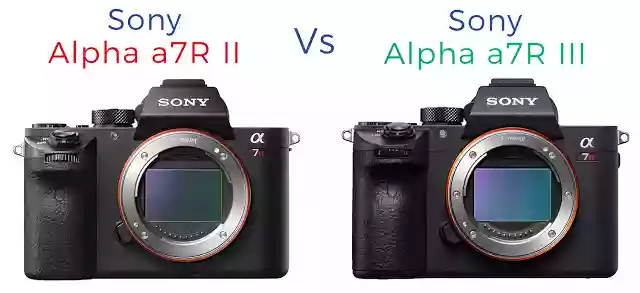
In this review we're looking at what those changes are from the Sony a7R II to the latest a7R III, we'll run through what's changed, what's new, and what's stayed the same so you can make an informed choice when you buy one of these outstanding mirrorless cameras.
Sony a7R III vs Sony a7R II At-a-Glance
Feature |
Sony a7R II |
Sony a7R III |
| Resolution | 42.4 Megapixels | 42.4 Megapixels |
| Sensor Size | 35mm Full Frame Back-Illuminated Exmor R CMOS Sensor |
35mm Full Frame Back-Illuminated Exmor R CMOS Sensor |
| focusing | 399 points Phase Detection AF
25 points Contrast Detection AF
|
399 points Phase Detection AF
425 points Contrast Detection AF
|
| Continuous Shooting | Max 5 frames per second Up to 23 RAW frames |
Max 10 frames per second Up to 76 RAW frames |
| Image Stabilisation | 5-Axis Image Sensor-Shift
4.5 Stops of compensation
|
5-Axis Image Sensor-Shift
5.5 Stops of compensation
|
| Video Quality | UHD 4K video with full pixel readout & no pixel binning |
UHD 4K video with full pixel readout & no pixel binning |
| LCD Screen | 3.0 inch TFT tilting LCD screen
1,228,800 dot resolution
|
3.0 inch TFT tilting LCD screen
1,440,000 dot resolution
|
| viewfinder | 0.5 inch XGA OLED EVF 2,359,296 dots |
0.5 inch Quad-VGA OLED EVF 3,686,400 dots |
| Connectivity | Wi-Fi, NFC, HDMI micro, Micro USB | Wi-Fi, NFC, HDMI micro, USB-C 3.1, Bluetooth |
| Storage | Multi slot for Memory Stick Duo or SD Card | Dual Slots - Slot 1: SD Card (UHS-II) Slot 2: Multi Slot for Memory Stick Duo or SD Card (UHS-I) |
| Battery Life | Max Approx 340 still shots Max Approx 95 mins continuous movie recording |
Max Approx 650 still images Max Approx 190 mins continous movie recording |
| Battery | NP-FW50 | NP-FZ100 |
| Weight | 625g (with battery & memory card) | 657g (with battery & memory card) |
Sony a7R II - Overview
Memory Card Slots
Firmly positioning the Sony a7R III as professional photographer's camera, it features Dual SD card slots, one of which is UHS-II compatible for fast data writing, and the other is a UHS-I compatible multi-slot that will accept either an SD card or Memory Stick.
This improves over the single UHS-I card slot that we found in the Sony a7R II.
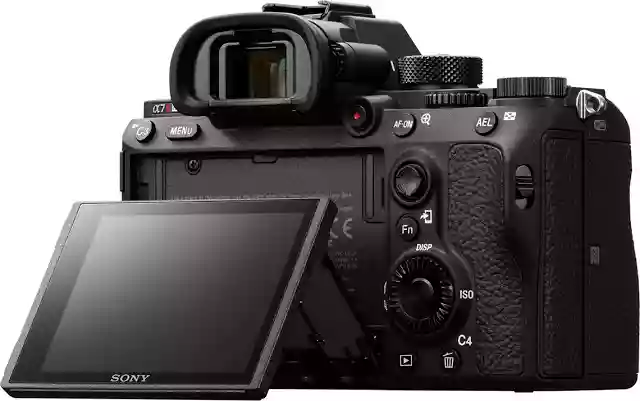
Video Quality
The Sony a7R III maintains the high resolution 4K movie recording ability we found in the a7R II, offering full pixel readout with no pixel binning, but now offers S-Log3 and S-Log2 gamma curves and a new HLG (Hybrid Log-Gamma) picture profile for HDR video workflow.
Sony a7R III - Hands-On First Look
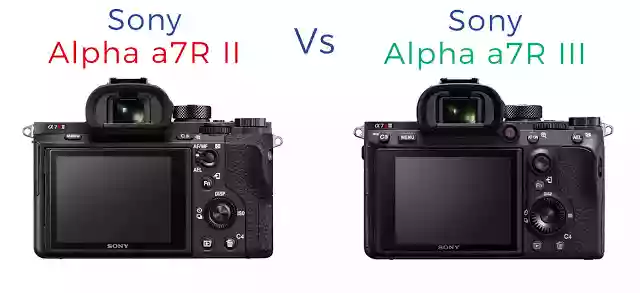
LCD Screen & Electronic viewfinder
The 3.0 inch (7.5cm) TFT LCD touchscreen that we found on the Sony a7R II has been upgraded from 1,228,800 dot resolution to 1,440,000 dot resolution on the a7R III and now offers touch focus operation either using the LCD screen only or using a fingertip while viewing through the viewfinder.
The EVF (electronic viewfinder) has also had an upgrade from a 0.5 inch XGA OLED viewfinder with 2,359,296 dot resolution in the a7R II to a 0.5 inch Quad-VGA OLED viewfinder with a resolution of 3,686,400 dots in the Sony a7R III.
This improvement over the a7R II gives the viewfinder in the a7R III much truer to life colour and brightness representations as well as being able to select between 100 or 120fps refresh rate. Additionally, a new focus magnifier function gives the ability to autofocus with a selected area magnified in the viewfinder.
Professional Connectivity
The a7R III inherits the Wi-Fi, NFC and HDMI micro connectivity from the a7R II and has done away with the Micro USB port in favour of a USB-C connection for fast data transfer and tethering capabilities.
The a7R III also introduces Bluetooth connectivity with the ability to load location data from your smart device onto still images on your camera.
A new Flash Sync terminal on the a7R III can now be used with non-dedicated flash units and cables with standard sync terminals for convenient synchronisation with a variety of flash units.
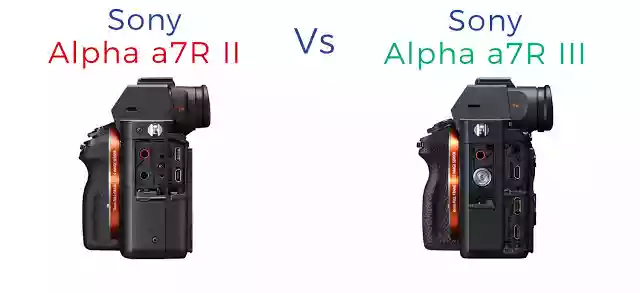
Extended Battery Life
The a7R III is the first a7 series camera from Sony to utilise Sony's higher power FZ battery range (found in the flagship a9), using the NP-FZ100 battery to give 530 still images using the viewfinder or 650 using the LCD monitor, as well as up to 100 minutes actual movie recording using the viewfinder or actual minutes using the LCD monitor. For continuous movie recording the a7R III will record for 180 minutes using the viewfinder or 190 minutes using the LCD monitor.
This is a vast improvement over the Sony a7R II which was only capable of 290 still images using the viewfinder or 340 with the LCD screen, and 50 minutes of actual movie recording with the viewfinder or 55 minutes actual movie recording with the LCD screen, and 95 minutes continuous movie recording with the viewfinder or LCD monitor.
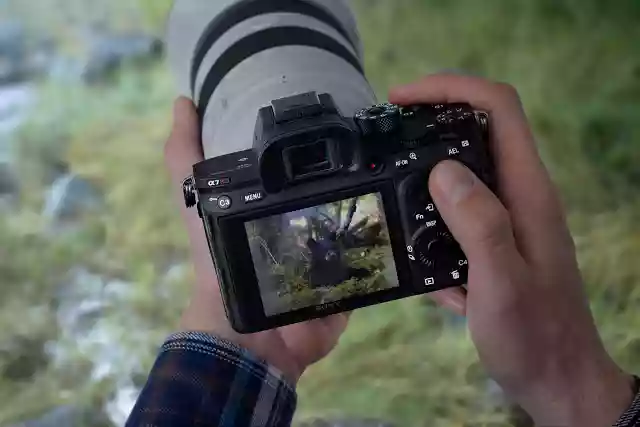
New Software Suite
To complement the a7R III, Sony have released a new imaging software suite called 'Imagine Edge'.
With three separate PC applications - Remote, Viewer and Edit available for free download, this suite of software extends the creative abilities of the shooting process and supports live-view PC remote shooting and RAW development. Live viewing on screen with semitransparent reference overlay capability is also available during tethered shooting.
The new Pixel Shift Multi Shooting feature on the a7R III can also be used when the camera is tethered to the PC, where the images can be immediately composited and viewed.
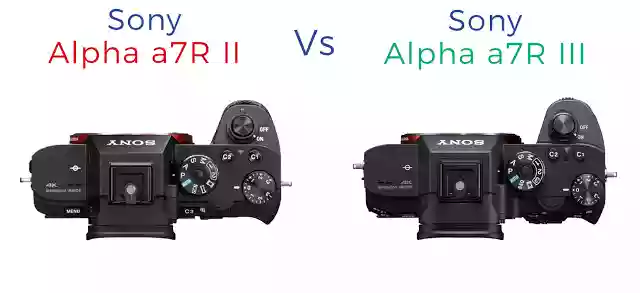
Conclusion of Sony a7R III vs a7R II
Overall, there have been a number of not-insignificant improvements to the Sony a7R III over the a7R II which make it a worthy successor and addition to the renowned Alpha a7 line-up.
Most notable improvements from the a7R II to the a7R III are to the Hybrid AF system, the faster continuous shooting ability, a more sensitive image stabilisation system, faster image processing and higher ISO ability, higher resolution LCD screens and electronic viewfinders, improved connectivity, dual SD card slots, and an improved battery life.
The Sony a7R III is a full-frame mirrorless camera built for professional photographers and videographers will value the professional standard connectivity, longevity of battery life, and the fast and accurate focusing systems.
The Sony a7R III will be available to pre-order at Park Cameras from Thursday 26th October 2017, with availability expected from November 2017. The Sony a7R II will still be available alongside its newer counterpart.
<
Share this post:
By Park Cameras on 25/10/2017
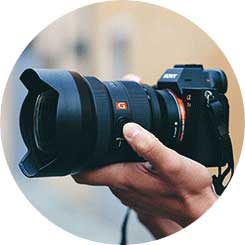
Trade in your old equipment
Fast and easy trade in service ensures your old gear is collected efficiently and you are paid quickly! It's very simple to trade in your unwanted photography gear. Just head over to our dedicated Sell or Part Exchange page, fill out the details, and we'll get back to you with an offer for your old gear. Take the cash, or put it towards the cost of your new gear. It's up to you! Find out more
sign up to the newsletter
Keep up to date on the latest photography news, events and offers. Sign up now